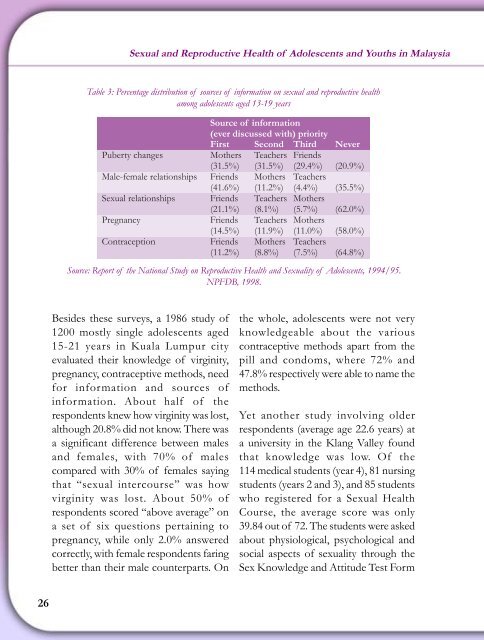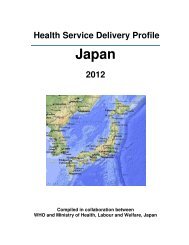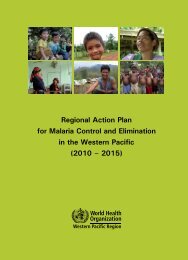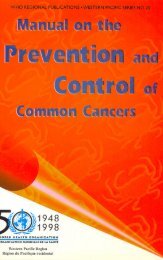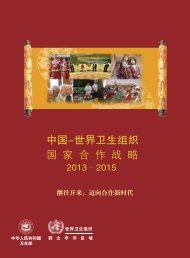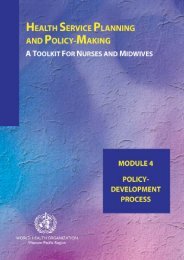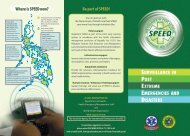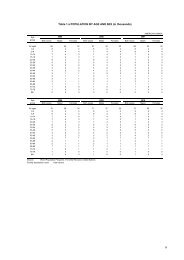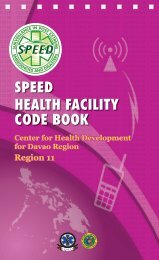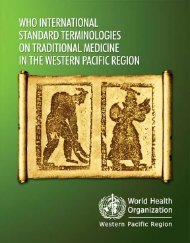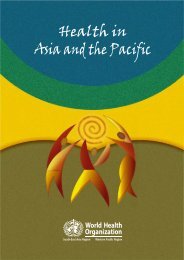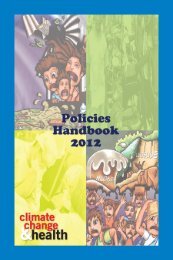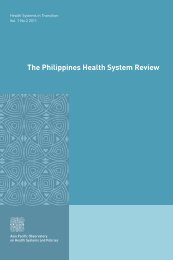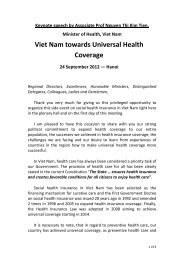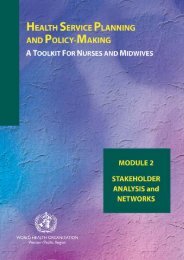Download pdf, 989kb - WHO Western Pacific Region - World Health ...
Download pdf, 989kb - WHO Western Pacific Region - World Health ...
Download pdf, 989kb - WHO Western Pacific Region - World Health ...
Create successful ePaper yourself
Turn your PDF publications into a flip-book with our unique Google optimized e-Paper software.
Sexual and Reproductive <strong>Health</strong> of Adolescents and Youths in Malaysia<br />
Table 3: Percentage distribution of sources of information on sexual and reproductive health<br />
among adolescents aged 13-19 years<br />
Puberty changes<br />
Male-female relationships<br />
Sexual relationships<br />
Pregnancy<br />
Contraception<br />
Source of information<br />
(ever discussed with) priority<br />
First<br />
Mothers<br />
(31.5%)<br />
Friends<br />
(41.6%)<br />
Friends<br />
(21.1%)<br />
Friends<br />
(14.5%)<br />
Friends<br />
(11.2%)<br />
Second<br />
Teachers<br />
(31.5%)<br />
Mothers<br />
(11.2%)<br />
Teachers<br />
(8.1%)<br />
Teachers<br />
(11.9%)<br />
Mothers<br />
(8.8%)<br />
Third<br />
Friends<br />
(29.4%)<br />
Teachers<br />
(4.4%)<br />
Mothers<br />
(5.7%)<br />
Mothers<br />
(11.0%)<br />
Teachers<br />
(7.5%)<br />
Never<br />
(20.9%)<br />
(35.5%)<br />
(62.0%)<br />
(58.0%)<br />
(64.8%)<br />
Source: Report of the National Study on Reproductive <strong>Health</strong> and Sexuality of Adolescents, 1994/95.<br />
NPFDB, 1998.<br />
Besides these surveys, a 1986 study of<br />
1200 mostly single adolescents aged<br />
15-21 years in Kuala Lumpur city<br />
evaluated their knowledge of virginity,<br />
pregnancy, contraceptive methods, need<br />
for information and sources of<br />
information. About half of the<br />
respondents knew how virginity was lost,<br />
although 20.8% did not know. There was<br />
a significant difference between males<br />
and females, with 70% of males<br />
compared with 30% of females saying<br />
that “sexual intercourse” was how<br />
virginity was lost. About 50% of<br />
respondents scored “above average” on<br />
a set of six questions pertaining to<br />
pregnancy, while only 2.0% answered<br />
correctly, with female respondents faring<br />
better than their male counterparts. On<br />
the whole, adolescents were not very<br />
knowledgeable about the various<br />
contraceptive methods apart from the<br />
pill and condoms, where 72% and<br />
47.8% respectively were able to name the<br />
methods.<br />
Yet another study involving older<br />
respondents (average age 22.6 years) at<br />
a university in the Klang Valley found<br />
that knowledge was low. Of the<br />
114 medical students (year 4), 81 nursing<br />
students (years 2 and 3), and 85 students<br />
who registered for a Sexual <strong>Health</strong><br />
Course, the average score was only<br />
39.84 out of 72. The students were asked<br />
about physiological, psychological and<br />
social aspects of sexuality through the<br />
Sex Knowledge and Attitude Test Form<br />
26


